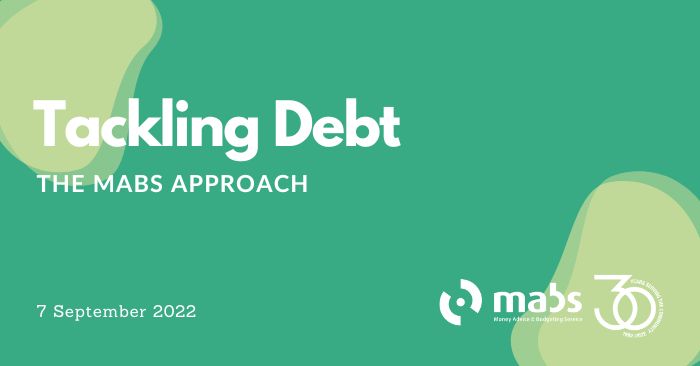MABS Approach to Tackling Debt

Trying to tackle your debt can seem like a never-ending and difficult challenge. You may think reducing your debt or clearing it all together is impossible. Perhaps:
- You want to clear your debt but don’t know where to start.
- Maybe you would like to start saving a little bit regularly?
This is where MABS comes in.
Our advisers provide practical information on a range of debt solutions and guidance on how to begin to tackle your debt. There are tools to help with understanding and planning your finances, and help is also available from MABS by phone, online and in person.
MABS offers free, supportive, non-judgmental budgeting and debt advice. You can be confident that our advice is always based on what’s best for you.
In today’s blog, we will discuss checking your level of debt, how to review a budget and provide guidance on contacting your creditors. Let’s get stuck in!
Check your level of debt
Firstly, confirm the level of debt that you have. You could do this by checking or requesting loan or credit card statements.
You may be ignoring the letters, emails, and phone calls. But the problem doesn’t go away.
Gather them up, take a moment when you feel ready and open them.
Once you’ve opened the letters and emails and have a better idea of your level of debt, you have completed the first step. You’re making great progress. The next step could be to decide what are priority debts and secondary debts. Priority debts include rent or mortgage payments, food, light, heat, and medical costs.
A good way of establishing how much debt is in your name is to check your CCR Central Credit Report. This can be done online and for free, and this can be done once a year with no cost: Apply for your credit report and other rights.
Once you have established your level of debt, you need to find out how much money you have available to pay your debts. And, if possible, look at ways of increasing your income. This can be done by reviewing your social welfare entitlements or looking at your tax situation, for example.
Look at your budget
Setting a realistic and sustainable budget for yourself is vital. Some people budget weekly, monthly, quarterly, or even yearly, depending on their needs.
As mentioned above, you should also look to see if you could increase your income. For example, renting out a room or taking in a student. Shop around for savings, such as cheaper insurances, switching your energy providers or TV and broadband.
You could also use our user-friendly budgeting tool on our website.
Contact your creditors
Once you’ve worked out who your creditors are – the people or organisations you owe money to – consider contacting them.
Inform them that you are beginning to tackle your debts and want to work out a repayment schedule with them. Doing this can help re-establish a relationship and prevent the debt from escalating. It may pre-empt further recovery action and be a positive step forward to resolving the issue.
We have good tools to help you communicate with your creditors.
We’re here for you
Our website has many step-by-step guides to support you in tackling your debt. Our top tip – always start with your priority debts, such as a roof over your head, heat, light, and food. Government debts like taxes, Local Property Tax and fines are usually considered priority debts.
If you are in arrears with your rent or utilities, look at tackling these debts first. Don’t be afraid to contact the council, your Approved Housing Body (AHB) or energy supplier. They all have dedicated staff who you look to put a plan in place to pay back your arrears.
If you are in mortgage arrears, each lender has an Arrears Support Unit that you can communicate with. They also have information about the different arrangements they offer to their customers to address their arrears. Alternatively, call MABS, and we can discuss your options with you.
After this, we look at what we call secondary debts – debts like personal bank loans, credit union loans, credit cards and overdrafts. In MABS, we recommend the pro-rata method of offering money to these debts as one option to repay.
What is pro-rata? Pro-rata means that you offer more of what you have available to the creditors that you owe more. The larger the debt, the more they get. It is the fairest way of dealing with all your debts.
Next Steps
Tackling your debt does not have to be a daunting or complicated process. Once you take a step back, acknowledge your level of debt and reach out to your creditors or MABS, it will make the process much easier. Starting this process is the first step toward being debt free or managing your debt.
If you have any questions or would like to speak to a member of MABS, call our National Helpline on 0818 07 2000 Monday to Friday, from 9am to 8pm, WhatsApp 086 035 3141 or request a callback if you want to talk confidentially about budgeting, general financial matters or problem debt.




Facebook
twitter
Instagram